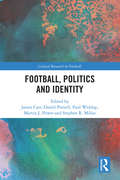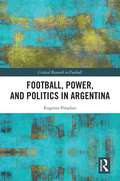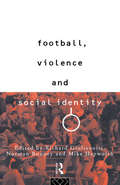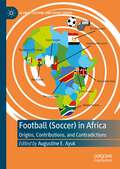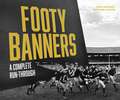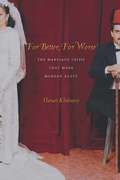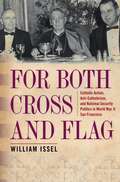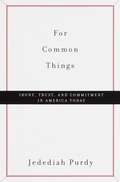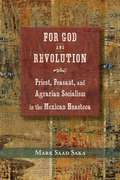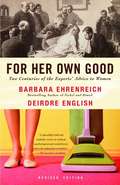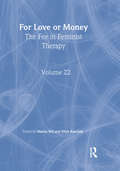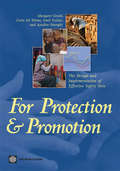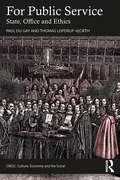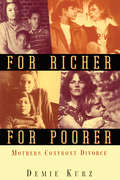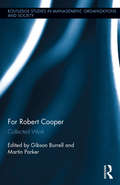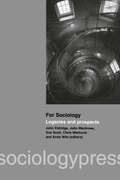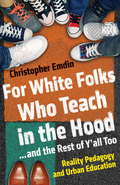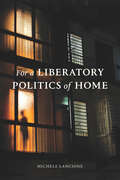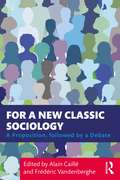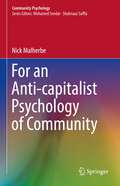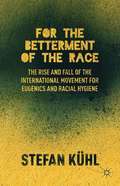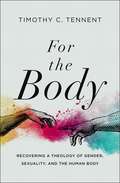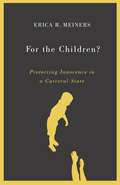- Table View
- List View
Football, Politics and Identity (Critical Research in Football)
by James Carr; Daniel Parnell; Paul Widdop; Martin J. Power; Stephen R. MillarThis book presents a series of fascinating case studies that show how the lives and bodies of clubs, players and fans around the world are enmeshed with politics. It draws on original research in countries including England, Scotland, Ireland, Poland, Mexico, Algeria and Argentina and includes both historical and contemporary perspectives. It explores some of the most important themes in the study of sport, including sectarianism, migration, fan activism and national identity, and shows how football continues to be tied to political events, symbols and movements. This is fascinating reading for any student or researcher working in sport studies, political science, sociology or contemporary history.
Football, Power, and Politics in Argentina (Critical Research in Football)
by Eugenio ParadisoThis book examines the interplay between football, politics, violence, passion, and morality in Argentina. Drawing on original ethnographic research, it considers the role of fans, club officials, politicians, and others in the spread and perpetuation of corruption and violence within football and in wider Argentinian society.Argentina’s triumph in the 2022 World Cup brought millions onto the streets of Buenos Aires in celebration, but this book argues that beneath the veneer of sporting success lie networks of power and practices that have naturalized corruption and violence within Argentinian football and, by extension, in Argentinian society as a whole. It shows how the actions of club officials, politicians, barras (groups of organized, violent fans), and the police, which together represent a system of clientelism, exemplify in the world of football the system of organized chaos that habitually defines Argentinian politics. With the barras given licence to engage in violent behaviours linked not only to sporting passion but also to economic and political interests, this book argues that football, politics, and violence have become entangled in a web of social relations that illustrate Argentina’s struggle to break the vicious cycle of corruption and impunity.Shining new light on the significance of sport in wider society and the centrality of football in one of the world’s greatest footballing nations, this book is essential reading for anybody with an interest in the anthropology, sociology, politics, or history of sport, or in political science, corruption, or Latin American studies.
Football, Violence and Social Identity
by Richard Giulianotti Mike Hepworth Norman BonneyDrawing on research from Britain, Europe, Argentina and the USA this volume examines the culture and loyalties of soccer players and crowds and their relationships to social order, disorder and violence. This informative and accessible book will be of interest to students of Sport Science and to all of those who love the game of soccer.
Football: Origins, Contributions, and Contradictions (Global Culture and Sport Series)
by Augustine E. AyukThis volume provides an analysis of the history, origins, and development of football in Africa. It brings together an edited assemblage of essays that describe and analyse football in nine African countries, including Cameroon, DRC, Egypt, Ghana, Kenya, Nigeria, Senegal, South Africa, and Uganda, from a social science perspective. The selection of these countries highlights the three major foreign languages and powers that have governed the continent; The English, the French, and Arabic, and provides a prism through which to analyze and compare how football developed in the various countries throughout Africa.This comparative methodology allow readers to identify similarities and differences in the progression of the game on the continent, and by focusing on football, an important relic of European colonialism in Africa, underscores the continued dependence on, and domination of Europeans on the Africans. In situating the genesis of the game, contributors examine and analyze the history, development, management, and mismanagement by bureaucrats at the political level as well as at various football federations throughout the continent.
Football’s Dark Side: Corruption, Homophobia, Violence and Racism in the Beautiful Game
by Ellis Cashmore Jamie ClelandAssociation football is the richest, most popular sport in history with a multicultural global following. It is also riven with corruption, racism, homophobia and a violence that has for decades resisted all attempts to tame it. Cashmore and Cleland examine football's dark side: the unpleasant, sleazy and downright nasty aspects of the sport.
Footy Banners: A Complete Run-Through
by Leigh Meyrick Matthew HagiasCelebrating one of AFL's longest-standing and most iconic traditions Have you ever wondered what makes Australian Rules Football so unique? Sure, the rules are unmistakably different to other sports, but it's the bizarre traditions and idiosyncrasies that make the game uniquely ours. One of those quirks is the team banner – an essential element of the pre-match build-up that has connected fans with their heroes for more than 80 years. The humble banner, or run-through as it's known by the purists, has become an iconic symbol of our love for the game. It's why cheer squads around the country dedicate countless hours each and every week to delicately craft their messages on crepe. This painstaking process culminates in a fleeting moment of glory as the teams run onto the ground before the banner is torn (quite literally) to shreds. From the funny to the offensive, the emotional to the political, banners come in all shapes and sizes and have evolved considerably, reflecting not only a changing cultural landscape but a changing game itself. Footy Banners: A Complete Run-Through is a collection of historical images, stories and unforgettable moments that pay homage to one of our game's longest-lasting rituals.
For Better, For Worse
by Hanan KholoussyIn early 20th-century Cairo, the "marriage crisis," a perceived rise in the number of middle class men choosing bachelorhood over marriage, was a subject of great concern among the urban middle class and an issue they felt demanded government intervention because it signified the demise of the nation. For Kholoussy (history and Middle East studies, The American U. in Cairo, Egypt), the discourse of the "marriage crisis" served as a metaphor for middle-class understandings of gender, national identity, law, and other socioeconomic and political concerns. He compares and contrasts this middle class discourse of the "marriage crisis" in the Cairo press with urban lower, middle, and upper class discourses that emerge from analysis of cases in the Islamic courts between 1898 and 1936. Annotation ©2010 Book News, Inc. , Portland, OR (booknews. com)
For Both Cross and Flag: Catholic Action, Anti-Catholicism, and National Security Politics in World War II San Francisco
by William IsselIn this fascinating, detailed history, William Issel recounts the civil right abuses suffered by Sylvester Andriano, an Italian American Catholic civil leader whose religious and political activism in San Francisco provoked an Anti-Catholic campaign against him. A leading figure in the Catholic Action movement, Andriano was falsely accused in state and federal Un-American Activities Committee hearings of having Fascist sympathies prior to and during World War II. As his ordeal began, Andriano was subjected to a hostile investigation by the FBI, whose confidential informants were his political rivals. Furthermore, the U. S. Army ordered him to be relocated on the grounds that he was a security risk. For Both Cross and Flagprovides a dramatic illustration of what can happen when parties to urban political rivalries, rooted in religious and ideological differences, seize the opportunity provided by a wartime national security emergency to demonize their enemy as 'a potentially dangerous person. ' Issel presents a cast of characters that includes archbishops, radicals, the Kremlin, J. Edgar Hoover, and more to examine the significant role faith-based political activism played in the political culture that violated Andriano's constitutional rights. Exploring the ramifications of this story,For Both Cross and Flagpresents interesting implications for contemporary events and issues relating to urban politics, ethnic groups, and religion in a time of war.
For Common Things: Irony, Trust and Commitment in America Today
by Jedediah Purdy"This is, perhaps, the work of a love letter... Such a letter brings something delicate and intimate into the light of shared vision. This disclosure is hazardous and frightening, but it is necessary because the kind of love that moves between people cannot survive in solitude. It must be made common if it is to live at all. Love letters, then, require the courage to stake oneself on an expression of hope that may very well come to nothing. They also indicate a perception of importance, a sense that some possibilities, however unlikely, are so important that not acknowledging them would be an act of terrible neglect."
For God and Revolution: Priest, Peasant, and Agrarian Socialism in the Mexican Huasteca
by Mark Saad SakaThis account traces the material and ideological roots of the rebellion to nineteenth-century liberal policies of land privatization and to the growth of a radical anarchocommunist agrarian consciousness. Elite landholders had held sway in the Mexican state of San Luis Potosí since colonial times. In the nineteenth century their seizures of agricultural lands clashed with the rising political consciousness of the Huastecos, who rose up to fight for their way of life. Saka further traces the roots of the Huasteco rebellion to the grassroots religiosity that had developed in the course of centuries of local clerical leadership as well as to a nationalism derived from Huastecan participation in Mexico's wars against the United States in the 1840s and France in the 1860s.
For Her Own Good: Two Centuries of the Experts' Advice to Women
by Barbara Ehrenreich Deirdre EnglishA provocative new perspective on female history, the history of American medicine and psychology, and the history of child-rearing unlike any other.
For Love or Money: The Fee in Feminist Therapy
by Ellyn Kaschak Marcia HillRealize how you can charge what your services are worth and still care about your clients!For Love or Money: The Fee in Feminist Therapy examines the rarely talked about topic of payment in therapy, taking a symbolic and psychological look at the meaning of fees to both the psychologist and client. This intelligent book offers firsthand advice and information concerning how gender can make a difference in your feelings about fees and how the managed care environment affects women clients. For Love or Money will help you handle your concerns about fees as it discusses payment for missed sessions, bartering, the meaning of fees with African-American women and with women in prison, and a model for pro bono work.Since most therapists don’t discuss fees with colleagues, For Love or Money provides you with a way to gain information that might not otherwise be available to you. As a therapist, you will explore perspectives on what other therapists think about fees and what feelings other therapists have about the amounts they charge for their services. Some of the fee issues you will examine include: five typical therapist conflicts that are felt when it comes to fees the need to change managed behavioral health care to include equal payment for mental health care, length and type of treatment at the discretion of the client and provider, and appropriate training in women’s mental health issues for all health care providers setting a frame of therapy that includes session time, session length, duration of treatment, fee, confidentiality, and the “rules” of client participation to allow for successful psychotherapy sound clinical reasons for enforcing payment for missed sessions and considering a situation where flexibility is recommended pro bono work that is satisfying With this insightful and well-written book, you will explore issues such as transference, the symbolic meaning of money, and feelings you may have that could interfere with your ability to follow through with your own payment policies. For Love or Money examines many of the issues that surround the taboo topic of fees and will assist you with tackling this seldom-addressed and often uncomfortable subject for the therapist who wants to help her clients, but may feel distressed at setting and sticking to established fees.
For Protection and Promotion: The Design And Implementation of Effective Safety Nets
by Margaret Grosh Azedine Ouerghi Emil Tesliuc Carlo Del NinnoSafety nets are noncontributory transfer programs targeted to the poor or vulnerable. They play important roles in social policy. Safety nets redistribute income, thereby immediately reducing poverty and inequality; they enable households to invest in the human capital of their children and in the livelihoods of their earners; they help households manage risk, both ex ante and ex post; and they allow governments to implement macroeconomic or sectoral reforms that support efficiency and growth. To be effective, safety nets must not only be well intended, but also well designed and well implemented. A good safety net system and its programs are tailored to country circumstances, adequate in their coverage and generosity, equitable, cost-effective, incentive compatible, and sustainable. Good safety nets are also dynamic and change over time as the economy changes or as management problems are solved and new standards are set. Drawing on a wealth of research, policy, and operational documents from both academia and the World Bank's work in over 100 countries, 'For Protection and Promotion' provides pragmatic and informed guidance on how to design and implement safety nets, including useful information on how to define eligibility and select beneficiaries, set and pay benefits, and monitor and evaluate programs and systems. The book synthesizes the literature to date and enriches it with new examples on various program options-cash transfers (conditional and unconditional), in-kind transfers, price subsidies, fee waivers, and public works. It concludes with a comprehensive diagnostic for fitting safety net systems and programs to specific circumstances.
For Public Service: State, Office and Ethics (CRESC)
by Paul Du Gay Thomas Lopdrup-HjorthThis book develops a particular stance on the subject of public service. It does so in large part by indicating how early modern political concepts and theories of state, sovereignty, government, office and reason of state can shed light on current problems, failings and ethical dilemmas in politics, government and political administration. Simply put, public service is an activity involving the constitution, maintenance, projection and regulation of governmental authority. Public service therefore has a distinctive character because of the singularity of its ‘official’ object or ‘core task’ – namely, the activity of governing in an official capacity through and on behalf of a state. In pursuing this activity, public servants – civil, juridical and military – have a range of tasks to perform. It is only once the nature of those tasks is appreciated that we are able to identify the unique character of public service. The authors employ early modern political concepts and doctrines of state, sovereignty, government, office and reason of state in order to critically analyse contemporary political issues and offer solutions to problems concerning the status and conduct of public service. This book aims to remind public servants of the status of their ‘calling’ as office-holders in the service of the state, a daunting task given the rising tide of populism and the widespread prevalence of anti-statist, bureaucrat-bashing political discourse. It stresses the governmental dimension of the work of public servants as occupants of official roles in the service of the state, in order to reinforce their legitimate position in articulating public interests against the excesses of private interests and intense partisanship that continue to dominate many societies. This timely and thought-provoking book will be of great interest to those working within a range of fields in the humanities and social sciences, including political science, history, sociology, philosophy, organization studies and public administration.
For Richer, For Poorer: Mothers Confront Divorce (Perspectives on Gender)
by Demie KurzFor Richer, For Poorer provides a new perspective on the impact of divorce on women. Based on interviews with a random sample of divorced mothers, this book identifies their real concerns: inadequate resources from their ex-husbands and the state, and unequal social policies. Presenting accounts of how they manage the divorce process, divorced women of diverse background describe their attempts to rebuild their own lives and those of their families. Demie Kurz proposes a reversal of policies which penalize the single-parent family by failing to provide mothers and children with adequate resources.
For Robert Cooper: Collected Work (Routledge Studies in Management, Organizations and Society)
by Martin Parker Gibson BurrellRobert Cooper, who died in 2013, was the leading theorist of organization working in England over the past few decades. Describing himself as a ‘social philosopher,’ he was one of the first writers to introduce post-structuralist and post-modern thought into theories of organization but was always reluctant to reduce what he did to being part of ‘Management.’ Instead, he concentrated on thinking about organizations and organizing, working with ideas about entity and process views of organizations, and also the dualisms of organization/environment, organization/disorganization, and concentrating particularly on ideas of the boundary or seam which divides and conjoins. He wrote about, and was influenced by systems theory and post-structuralist philosophy, particularly Whitehead, Bateson, Deleuze, Derrida, Foucault and Simmel. Cooper has already been the subject of much commentary but much of his work is not well known, and it deserves a wider readership. The purpose of this collection is to gather together a body of essays which are widely dispersed in journals and edited collections. This is a repository of pieces and extracts which stand the test of time, and scholars will benefit from a collection which pulls together some of his most influential work. The collection also contains two essays, one biographical and one intellectual, about Cooper and his work.
For Sociology: Legacies and Prospects
by Anne Witz Sue Scott Chris Warhurst John Eldridge John MacInnesFirst published in 2001. For Sociology is not the dogmatic stand of a single discipline against the tide of interdisciplinarity. Rather it is an attempt to explore the nature of sociological argument and the relationship of sociology both to the natural sciences and other social sciences, as well as assessing its role in understanding the complexities of the contemporary world.The essays in the collection were all presented at the British Sociological Association's annual conference in 1999, which sought to reassess sociology thirty years on from Alvin Gouldner's famous challenge to the discipline. Through reflection on the continuities and discontinuities in the discipline, and an exploration of some of the key themes and issues of our time, the writers represented here pose new challenges to the sociological imagination.
For The Love Of Men: From Toxic To A More Mindful Masculinity
by Liz PlankIn 2019, traditional masculinity is both rewarded and sanctioned. Men grow up being told that boys don’t cry and dolls are for girls (a newer phenomenon than you might realize—gendered toys came back in vogue as recently as the 80s). They learn they must hide their feelings and anxieties, that their masculinity must constantly be proven. They must be the breadwinners, they must be the romantic pursuers. This hasn’t been good for the culture at large: 99% of school shooters are male; men in fraternities are 300% (!) more likely to commit rape; a woman serving in uniform has a higher likelihood of being assaulted by a fellow soldier than to be killed by enemy fire. <p><p> In For the Love of Men, Liz offers a smart, insightful, and deeply-researched guide for what we're all going to do about toxic masculinity. For both women looking to guide the men in their lives and men who want to do better and just don’t know how, For the Love of Men will lead the conversation on men's issues in a society where so much is changing, but gender roles have remained strangely stagnant. <p> What are we going to do about men? Liz Plank has the answer. And it has the possibility to change the world for men and women alike.
For White Folks Who Teach in the Hood ... and the Rest of Y'all Too: Reality Pedagogy and Urban Education
by Christopher Emdin<P>Merging real stories with theory, research, and practice, a prominent scholar offers a new approach to teaching and learning for every stakeholder in urban education. <P>Drawing on his own experience of feeling undervalued and invisible in classrooms as a young man of color and merging his experiences with more than a decade of teaching and researching in urban America, award-winning educator Christopher Emdin offers a new lens on an approach to teaching and learning in urban schools. <P>He begins by taking to task the perception of urban youth of color as unteachable, and he challenges educators to embrace and respect each student's culture and to reimagine the classroom as a site where roles are reversed and students become the experts in their own learning. <P>Putting forth his theory of Reality Pedagogy, Emdin provides practical tools to unleash the brilliance and eagerness of youth and educators alike--both of whom have been typecast and stymied by outdated modes of thinking about urban education. <P>With this fresh and engaging new pedagogical vision, Emdin demonstrates the importance of creating a family structure and building communities within the classroom, using culturally relevant strategies like hip-hop music and call-and-response, and connecting the experiences of urban youth to indigenous populations globally. <P>Merging real stories with theory, research, and practice, Emdin demonstrates how by implementing the "Seven C's" of reality pedagogy in their own classrooms, urban youth of color benefit from truly transformative education. <P>Lively, accessible, and revelatory, For White Folks Who Teach in the Hood. . . and the Rest of Y'all Too is the much-needed antidote to traditional top-down pedagogy and promises to radically reframe the landscape of urban education for the better.
For a Liberatory Politics of Home
by Michele LancioneIn For a Liberatory Politics of Home, Michele Lancione questions accepted understandings of home and homelessness to offer a radical proposition: homelessness cannot be solved without dismantling current understandings of home. Conventionally, home is framed as a place of security and belonging, while its loss defines what it means to be homeless. On the basis of this binary, a whole industry of policy interventions, knowledge production, and organizing fails to provide solutions to homelessness but perpetuates violent and precarious forms of inhabitation. Drawing on his research and activism around housing in Europe, Lancione attends to the interlocking crises of home and homelessness by recentering the political charge of precarious dwelling. It is there, if often in unannounced ways, that a profound struggle for a differential kind of homing signals multiple possibilities to transcend the violences of home/homelessness. In advancing a new approach to work with the politics of inhabitation, Lancione provides a critique of current practices and offers a transformative vision for a renewed, liberatory politics of home.
For a New Classic Sociology: A Proposition, followed by a Debate
by Alain Caillé and Frédéric VandenbergheThis book examines the future of the social sciences and the reconstruction of society in contemporary times. Drawing on the lead piece For a New Classic Sociology, it calls for a new theoretical synthesis that overcomes the fragmentation, specialization and professionalization within the social sciences. The position paper and the responses by a team of world-class social theorists provide an alternative to utilitarianism and the colonization of the social sciences by rational choice models, propose a new articulation of social theory, and moral, social and political philosophy. It recommends a return to classical social theory and explores articulations between theories of reciprocity, care and recognition. A radical intervention in the study of the social sciences, the volume will be indispensable to scholars and researchers across the social sciences, especially social theory and sociology and social anthropology. Contributions by Frank Adloff, Jeffrey C. Alexander, Francis Chateauraynaud, Raewyn Connell, François Dubet, Philip Gorski, Nathalie Heinich, Qu Jingdong, Mike Savage, Michael Singleton and Philippe Steiner.
For an Anti-capitalist Psychology of Community (Community Psychology)
by Nick MalherbeAnti-capitalist political struggle is a site of struggling psychologies. Conscious political action is never far from unconscious desire, and the fight for material justice is always also the fight for dignity and psychological well-being. Yet, how might community psychologists conceive of their discipline in a way that opposes the very capitalist political economy that, historically, most of the psy-disciplines have bolstered in return for disciplinary legitimacy? In its consideration of an anti-capitalist psychology of community, this book does not ignore or try to resolve the contradictory position of such a psychology. Instead, it draws on these contradictions to enliven psychology to the shifting demands - both creative and destructive - of a community-centred anti-capitalism. Using practical examples, the book deals with the psychological components of building community-centred social movements that challenge neoliberal capitalism as a political system, an ideology, and a mode of governing rationality. The book also offers several theoretical contributions that grapple with how an anti-capitalist psychology of community can remain attentive to the psychological elements of anti-capitalist struggle; what the psychological can tell us about anti-capitalist politics; and how these politics can shape the psychological.
For the Betterment of the Race: The Rise and Fall of the International Movement for Eugenics and Racial Hygiene
by Stefan KühlRacism, race hygiene, eugenics, and their histories have for a long time been studied in terms of individual countries, whether genocidal ideology in Nazi Germany or scientific racial theories in the United States. As this study demonstrates, however, eugenic racial policy and scientific racism alike had a strongly international dimension. Concepts such as a 'Racial Confederation of European Peoples' or a 'blonde internationalism' marked the thinking and the actions of many eugenicists, undergirding transnational networks that persist even today. Author Stefan Kühl provides here a historical foundation for this phenomenon, contextualizing the international eugenics movement in relation to National Socialist race policies and showing how intensively eugenicists worked to disseminate their beliefs throughout the world.
For the Body: Recovering a Theology of Gender, Sexuality, and the Human Body (Seedbed Resources)
by Timothy C. TennentAn in-depth look at what it means to be created in the image of God and how our bodies serve as icons that illuminate God's purposes instead of ours.The human body is an amazing gift, yet today, many people downplay its importance and fail to understand what Christianity teaches about our bodies and their God-given purposes. Many people misunderstand how the body was designed, its role in relating to others; and we lack awareness of the dangers of objectifying the body, divorcing it from its intended purpose.Timothy Tennent covers topics like marriage, family, singleness, and friendship, and he looks at how the human body has been objectified in art and media today. For the Body offers a biblical framework for discipling people today in a Christian theology of the body.Tennent—theologian and president of Asbury Theological Seminary—explores the contours of a robust Christian vision of the body, human sexuality, and the variety of different ways we are called into relationships with others. This book will reveal a theological vision that:Informs our self-understanding of our own bodies.Examines how we treat others.Reevaluates how we engage today's controversial and difficult discussions on human sexuality with grace, wisdom, and confidence.For the Body is a call to a deeper understanding of our bodies and an invitation to recapture the wonder of this amazing gift.
For the Children?: Protecting Innocence in a Carceral State
by Erica R. Meiners&“Childhood has never been available to all.&” In her opening chapter of For the Children?, Erica R. Meiners stakes the claim that childhood is a racial category often unavailable to communities of color. According to Meiners, this is glaringly evident in the U.S. criminal justice system, where the differentiation between child and adult often equates to access to stark disparities. And what is constructed as child protection often does not benefit many young people or their communities. Placing the child at the heart of the targeted criminalization debate, For the Children? considers how perceptions of innocence, the safe child, and the future operate in service of the prison industrial complex.The United States has the largest prison population in the world, with incarceration and policing being key economic tools to maintain white supremacist ideologies. Meiners examines the school-to-prison pipeline and the broader prison industrial complex in the United States, arguing that unpacking child protection is vital to reducing the nation&’s reliance on its criminal justice system as well as building authentic modes of public safety. Rethinking the meanings and beliefs attached to the child represent a significant and intimate thread of the work to dismantle facets of the U.S. carceral state. Taking an interdisciplinary approach and building from a scholarly and activist platform, For the Children? engages fresh questions in the struggle to build sustainable and flourishing worlds without prisons.
